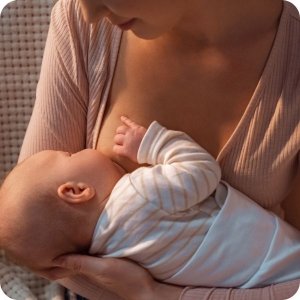Helen Borg is a senior midwife and infant feeding specialist who heads up the drop-in breastfeeding clinic at Mater Dei hospital. As mentioned in the series intro, Helen will cover common issues that can arise when feeding your newborn, giving professional advice and reassurance to help make your journey run smooth.
![]()
Q. For some women, their breast milk begins to leak during pregnancy, whereas others have no sign of milk until well after the birth. Why is this, and are either of these scenarios a cause for concern?
A. The way the process works means that during pregnancy, the hormones that your placenta is producing actually supress the action of ‘prolactin’ (the hormone that makes your body produce milk). So, your body is purposely stopping the breast from producing large volumes of milk. If the levels of the placenta hormones are high, which they should be in pregnancy, then you shouldn’t have milk coming through.
 When the placenta is born, you are obviously no longer receiving these prolactin-inhibiting hormones, but it still takes a couple of days for them to clear and drop enough that prolactin can become active. The breast has been prepared in pregnancy for lactation, so it’s literally like turning on a switch, and that’s when you get the full, uncomfortable breasts where milk has started to come in suddenly and in large volumes.
When the placenta is born, you are obviously no longer receiving these prolactin-inhibiting hormones, but it still takes a couple of days for them to clear and drop enough that prolactin can become active. The breast has been prepared in pregnancy for lactation, so it’s literally like turning on a switch, and that’s when you get the full, uncomfortable breasts where milk has started to come in suddenly and in large volumes.
Any leaking during the pregnancy is therefore more likely to be colostrum, a highly concentrated, milk-like fluid that comes through before the actual breast milk. Some women leak colostrum during pregnancy, and some women don’t. Both are normal and have no significance on what’s going to happen afterwards.
What you would expect to happen in pregnancy is for the breast size to increase. If there is no size increase, this can be a warning sign of potential problems with future feeding. It doesn’t matter if it’s just a small increase, as long as you’ve gone up at least one size during pregnancy then you’re on the right track.
![]()
When it comes to spare equipment for new mums, the breastfeeding clinic relies on donations, so if you have any of the following that you no longer need, you can drop them off at the clinic where they will be gratefully received!
-Breast pumps
-Nipple shields
-Milk storage bags or containers
-Breast pads
If you find yourself struggling or looking for additional advice, don’t hesitate to contact the breastfeeding clinic at Mater Dei hospital.



